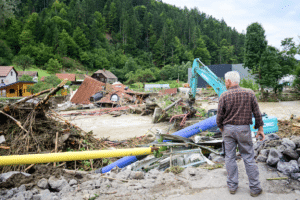From the earthquake in Turkey to the floods in Greece, Slovenia, and Emilia-Romagna, and the payments for Marche and Romania’s 2022 disaster: Although the Union can raise up to 500 million euros a year through its off-budget tool, this amount is currently insufficient to combat the effects of climate change.

A picture shows a flooded road in the town of Lugo on May 18, 2023, after heavy rains caused flooding across Italy’s northern Emilia Romagna region. Rescue workers searched on May 18, 2023 for people still trapped by floodwaters in northeast Italy as more residents were evacuated after downpours which killed nine people and devastated homes and farms. (Photo by Andreas SOLARO / AFP)
Brussels – Once upon a time, the EU member states could respond to the aftermath of natural disasters with both short- and long-term recovery thanks to the Solidarity Fund, which lasted for 20 years. However, if the EU institutions are unable to come up with long-term solutions to increase the effectiveness of the Union’s off-budget facility in the face of the mounting problems posed by climate change, this success story might have come to an end. The EU Solidarity Fund’s funding was almost completely spent in 2023, uncovering many months of unmet demand. This was the first time that it was shown that a half-billion-euro fund for a year would no longer be sufficient in the face of current and foreseeable catastrophic weather occurrences.

An off-budget mechanism known as the Solidarity Fund enables the annual mobilisation of up to €500 million, plus any cash left over from the previous year, to partially finance reconstruction expenses. Natural disaster-affected EU member states may submit an application to the commission for its activation within 12 weeks of the first damage being discovered, together with an assessment of the damage. Private damage is not eligible for this arrangement, which permits emergency interventions like the prompt restoration of essential infrastructure functionality (energy, telecommunications, transportation, health, and education), the provision of temporary housing for the populace, clean-up efforts, and the preservation of cultural heritage. The Community Executive’s evaluation of the application will determine whether or not monies are granted.
Three natural calamities that struck between late 2022 and early this year nearly completely depleted the 2023 money. The co-legislators approved the commission’s proposal, which included €33.9 million set aside to address Romania’s drought until August 2022, 20.9 million to assist Italy following September’s floods in the Marche region, and 400 million to aid Turkey in recovering from the February earthquakes. This means that a total of €454.8 million had already been distributed before the three major crises of 2023. The floods in Emilia-Romagna in early May, the floods in Slovenia in early August—the biggest natural disaster in its history—and the ones in Greece in the Thessaly region a month later have left just €45 million in the Solidarity Fund coffers (plus the remaining unused in 2022).
All three of the member nations have applied to the Solidarity Fund; however, so far this year, only Rome and Ljubljana have been granted advances to aid with restoration. The decision by Brussels to provide 94.7 million for Emilia-Romagna and 100 million for Slovenia was made in November. Meanwhile, Commissioner Elisa Ferreira recently revealed in response to a parliamentary question that “the Commission is assessing the request” from Athens regarding the floods that occurred in Thessaly on November 20. Regardless, all three requests will be covered by the 2024 Solidarity Fund budget, though the exact amount will depend on how much money is available and how many crises the Union and its member nations will encounter.

Due to this, the European Parliament has been pressing the EU Commission to address the issue of the reserve’s annual depletion of €500 million, which makes it insufficient to handle increasingly catastrophic natural phenomena. By raising the caps on individual allocations, MEPs propose doubling the sum to $1 billion annually. As an alternative, the Community Executive has suggested increasing the appropriations for the Solidarity and Emergency Aid Reserve (Sear) by 2.5 billion euros as part of the proposal to revise the EU multiannual budget 2021–2027. These funds would then be divided between the Solidarity Fund and the Emergency and Aid Reserve for the final four years of the programming period.
The Solidarity Fund was established in 2002 and will remain active until 2022. During that time, it has contributed over 8.2 billion euros to 127 disasters in 25 member states, the United Kingdom, and three acceding states (Albania, Montenegro, and Serbia), 107 of which are associated with extreme weather events. Italy received slightly more than two times the amount of these funds—roughly one-third, or just over $3 billion—than Germany, the second-largest receiver ($1.6 billion). While France (403 million), the United Kingdom (222 million), and Austria (213 million) are closer, Croatia is also above the billion level. Malta now receives the fewest benefits (961,000 euros). Finland and Denmark are the only EU members that, in 20 years, have never requested for or received any funding from the EU Solidarity Fund, together with Albania (900,000) and Montenegro (199,000).










